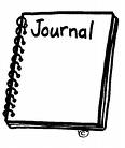Writing as Therapy
Writing is often an integral part of therapy, such as using thought record sheets and mood or activity diaries. Additional therapeutic techniques that involve writing may be helpful at particular times.
There are many benefits to writing, including 'getting it out of our head', seeing things from another perspective, a part of exposure work (distressing memories), or externalising the problem - perhaps even just putting words on paper seems to really help. You might choose to set a time limit for your writing. If writing to yourself, ensure you do so in a compassionate way.
Rainy Day Letter To Self
Some people find it helpful, when they're feeling well and able to cope with daily life, to write a letter to themselves, to read when they're not feeling so good, or are struggling to cope. The well, stable and strong you, writes a letter to the more vulnerable you.
If you don't feel you're ever in a good enough place to write a letter in this way, you could try imagining that you are feeling well, strong and able to cope, or perhaps older and wiser, and write a letter from the future, to your present more vulnerable self, offering guidance and support for how to get to that better place. Make sure you write a compassionate letter.
You might decide that you can read this letter at certain times, when you're feeling a certain way, or when you're struggling with particularly dark thoughts.
In your letter, you might want to include:
- What helps you feel better at those times
- What you've found that helped in the past
- Guidance on what you need to do (e.g. talk to someone, do something, be with others)
- Advice on what not to do - as you know from experience that it doesn't help you in the long run
- Your personal strengths and resources
- What you need to know at that time
- I understand, I've been there, I care, others care - even though it might feel like they don't, you can get through this, you've done it before, remind yourself to use particular techniques to help get you through, "it will pass"
- Be compassionate, caring, supportive, understanding, encouraging to your vulnerable self
Compassionate Letter to Self
It can be really helpful to write a letter to yourself expressing compassion, acceptance and understanding, just as we might to someone we care a lot about.
Write the letter as if it was from someone who knows you well, and cares for and accepts you totally for who you are - with all your past experiences and weaknesses, as well as your positives). It is better if you can imagine a perfect being - like an imaginary friend, or perhaps a perfect version of someone you trust and know. This compassionate imaginary friend will be wise, kind, accepting and forgiving.
Remind yourself in the letter that we are all human, we all make mistakes and cannot escape pain and suffering.
Write what you imagine this perfect imaginary friend might say to you now, as you think about yourself and your experiences. Write what your kind, wise, forgiving friend would advise you to do, what positive changes you might make.
How would this compassionate friend say these things in a kind, wise, forgiving and understanding way, wanting only the best for you.
You could store this letter in your Compassionate Kit Bag, or carry it safely around with you. When you later come to read it, slow down and breathe before you start, and allow the words to sink in. Notice how that feels.
Writing Your Story
It can often be helpful to write down what's happened to you, either over your lifespan, or perhaps a particular distressing memory. Take some time, when you won't be disturbed, and write down everything you can remember about that time.
Get it all on paper. Once it's there, you might choose to re-arrange it so that it reads like a chronological story, as it happened. You might choose to write it as a story, or in note form, using bullet points with a brief description. The more you can write, the better. You can build it up over time.
Describe the circumstances, the ages and size of people involved. Perhaps consider the bigger picture - what was going on not only for yourself but for others involved too. Describe what you felt, thought and did at that time, and from a compassionate stand-point.
This helps to put the story together (it's often fragmented in our memories), helps get it out of our heads, and often enables us to see a different perspective on what happened.
Once it's on paper, we can read it through as often as we need to, in order to put the memory in its proper place - as a story, a memory, from the past, that belongs in the past.
Letters To Others
Sometimes it's helpful to write a letter to others, perhaps about what you really think or feel about them or what they did that hurt you so much, or to express how much you appreciate someone, or want to say sorry, or that you want to forgive.
You might want to wait a while, and perhaps discuss with your therapist or a wise friend, before deciding whether it's a good idea to actually send the letter (if the person is still alive and known to you), or you might choose to deal with it differently.
Some people find it helpful to (go outside and) burn the letter, watching the smoke rise up, particularly if the person has died. Or just imagine the letter arriving at its destination, the person reading it, and seeing the reaction you want them to have. Or maybe it's enough just to have written it, so another option may be shredding it, or watching it slowly disintegrate whilst soaking in water.
A Better Future
Sometimes, when we're feeling really hopeless, believing things can never change, it can be helpful for us (or have a trusted someone else) to write an account describing us in a desired future, maybe in one, five or many years from now.
Someone who has been depressed, anxious, in debt, unemployed and unable to support their family financially - may write (or have written by someone else) a letter describing them finding a satisfying job, getting on with colleagues, receiving positive feedback from the management about how you're getting on at that time, bringing home the money your family needs in order to cope, and even put some aside for a holiday.
Random Writing - The Mind Dump
It can be helpful to just write down whatever comes into our heads, perhaps for a certain period of time - 10 minutes or half an hour. It may read as nonsense, and that's okay. That's how our minds work. Write down all the random, apparently nonsensical words and sentences, anything that comes to mind. You might include brief descriptions or sketches of any images that come to mind. Don't change or edit anything. Simply write.
You might then look back and see if there's anything there worth spending time thinking about, or you might decide that it's okay to just leave it there, on the paper. You can choose what you then do with the paper - to keep or destroy it, and how to do that.
Keep A Notepad With You
If you have trouble sleeping, it can be useful to have a notepad and pen or pencil on your bedside table, so you can jot down any worries that come to mind, and tell yourself you can deal with or pay attention to them in the morning. Carrying a notepad in your handbag or pocket means you can write down anything, anytime.
You could also use an app for your smart phone or tablet if you haven't got easy access to pen and paper.
Keeping A Journal
You can write, whatever you want to write, every day, or whenever you need to, your thoughts, feelings, responses. These can be intensely private, what you wouldn't share with anyone else.
Write at times when you feel just okay, when you feel great, and times when you're really distressed or struggling to cope. It helps to put things in perspective, get it out of your head and onto paper (or on a computer, smartphone or tablet), and means you can look back on it at another time, if that would be helpful - to see how you coped, that things can and will be better, that you can survive, that this will pass.
Writing As Therapy: this page as PDF
Futureme.org - write an email to your future self
Worksheets
If you prefer to use a guided self-help worksheet, you'll find many on this page
See this PTSD page for writing about traumatic events.
Books
Write Therapy: Using the Power of Writing to Heal the Past and Create a Life You Want
Writing Therapy For Dealing With Depression
Writing In Bereavement: A Creative Handbook
Resources
Writing As Therapy: this page as PDF
Worksheets
If you prefer to use a guided self-help worksheet, you'll find many on this page
See this PTSD page for writing about traumatic events.
Books
Write Therapy: Using the Power of Writing to Heal the Past and Create a Life You Want
Writing Therapy For Dealing With Depression
Writing In Bereavement: A Creative Handbook




















